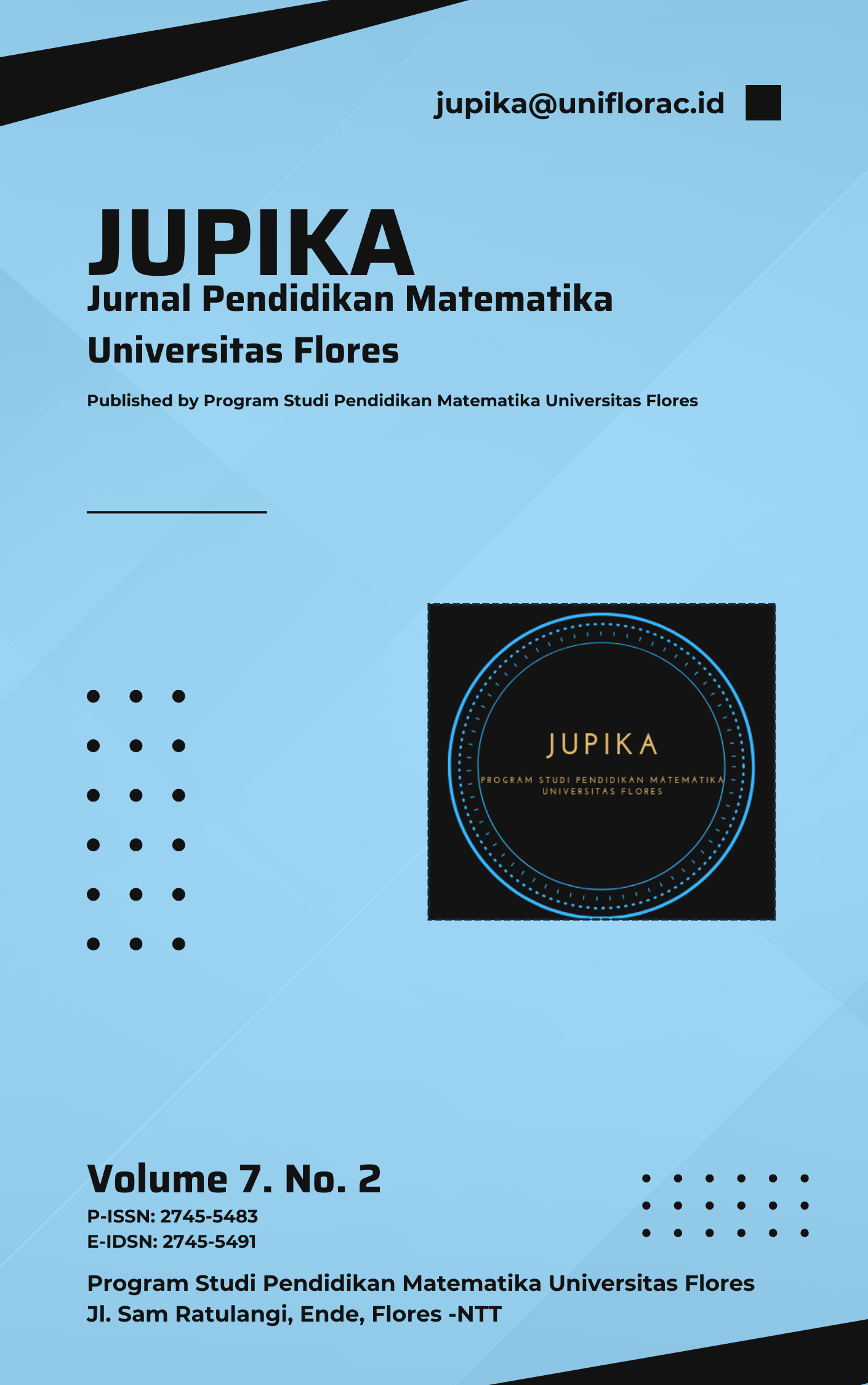PENGARUH MODEL PEMBELAJARAN AUDITORY INTELLECTUALLY REPETITION TERHADAP KEMAMPUAN PEMAHAMAN KONSEP MATEMATIKA SISWA
DOI:
https://doi.org/10.37478/jupika.v7i2.4295Abstract
This study aims to determine the influence of the Auditory intellectual repetition (AIR) learning model on the ability to understand mathematical concepts of grade VII students of SMP Negeri 1 Tinambung. This study is a quantitative research with an Experimental Design. The sampling technique used was purposive with a sample of 56 students. It consists of class VII C with 27 students as the control class and class VII D with 29 students as the experimental class. The instruments in this study are concept comprehension ability tests and observation sheets of the implementation of teacher learning and student activities. The data collection technique was carried out with an essay test of 5 questions. Data analysis uses descriptive analysis and inferential analysis. Based on descriptive analysis, students' ability to understand mathematical concepts with the Auditory Intellectually Repetition (AIR) learning model is classified as high, while students' ability to understand mathematical concepts with the direct learning model is classified as medium category. Furthermore, inferential analysis using an independent test of t-test samples found that there was an influence of the Auditory Intellectually Repetition (AIR) learning model on the ability to understand mathematical concepts of grade VII students.
Downloads
Keywords:
Auditory Intellectually Repetition, Ability to Understand Mathematical Concepts, Build SpaceReferences
Abrar, M., Apriliani, V., & Yunus, J. (2020). Kemampuan Pemahaman Konsep Matematika Siswa SMP Melalui Penerapan Model Pembelajaran Auditory Intellectually Repetition. Statmat: Jurnal Statistika Dan Matematika, 2(2), 158–166. https://doi.org/10.32493/sm.v2i2.5648.
Apriliya, D. C., Amin, L. H., & Rochmawan, A. E. (2023). Efektivitas Penerapan Kurikulum Merdeka Belajar Pada Kemampuan Kognitif Matematika Siswa MI Ta’mirul Islam Surakarta. Raudhah Proud To Be Professionals: Jurnal Tarbiyah Islamiyah, 8(2), 607-615. http://ejournal.stit-ru.ac.id/index.php/raudhah/article/view/413
Fajar, A. P., Kodirun, K., Suhar, S., & Arapu, L. (2018). Analisis Kemampuan Pemahaman Konsep Matematis Siswa Kelas VIII SMP Negeri 17 Kendari. Jurnal Pendidikan Matematika, 9(2), 229-239.https://doi.org/10.36709/jpm.v9i2.5872
Fitri, S., & Utomo, R. B. (2016). Pengaruh model pembelajaran auditory, intellectually, and repetition terhadap kemampuan pemahaman konsep di SMP Pustek Serpong. JURNAL e-DuMath, 2(2).193-201, https://doi.org/10.52657/je.v2i2.182
Huriyanti, L., & Rosiyanti, H. (2017). Perbedaan Motivasi Belajar Matematika Siswa Setelah Menggunakan Strategi Pembelajaran Quick on the Draw. FIBONACCI: Jurnal Pendidikan Matematika Dan Matematika, 3(1), 65-76. https://doi.org/10.24853/fbc.3.1.65-76
Hutagalung, R. (2017). Peningkatan Kemampuan Pemahaman Konsep Matematis Siswa Melalui Pembelajaran Guided Discovery Berbasis Budaya Toba di SMP Negeri 1 Tukka. MES: Journal of Mathematics Education and Science, 2(2). https://jurnal.uisu.ac.id/index.php/mesuisu/article/view/133.
Karunia, E. P., & Mulyono, M. (2017). Analisis Kemampuan Pemahaman Konsep Siswa Kelas VII Berdasarkan Gaya Belajar dalam Model Knisley. PRISMA, Prosiding Seminar Nasional Matematika, 337-346. Retrieved from https://journal.unnes.ac.id/sju/prisma/article/view/2161
Ramadhan, M. R. (2023). Pengaruh Penerapan Model Pembelajaran Auditory Intellectualy Repetition (AIR) Terhadap Kemampuan Pemahaman Konsep Matematis Siswa di SMP Muhammadiyah 50 Jakarta. Jurnal Riset Pendidikan Matematika Jakarta, 5(1), 72-82. https://journal.unj.ac.id/unj/index.php/jrpmj/article/view/34231
Saputra, A., & Azka, R. (2020). Pengembangan Komik Matematika untuk Memfasilitasi Kemampuan Pemahaman Konsep dan Motivasi Belajar Siswa SMP. Jurnal Pengembangan Pembelajaran Matematika, 2(2), 89–97. https://doi.org/10.14421/jppm.2020.22.89-97
Sarniah, S., Anwar, C., & Putra, R. W. Y. (2019). Pengaruh Model Pembelajaran Auditory Intellectually Repetition terhadap Kemampuan Pemahaman Konsep Matematis. Journal of Medives: Journal of Mathematics Education IKIP Veteran Semarang, 3(1), 87-96 https://doi.org/10.31331/medivesveteran.v3i1.709
Shabrina, R., Eliza, R., & Khaidir, C. (2021). Pengaruh Model Pembelajaran Auditory Intellectually Repetition (Air) Terhadap Kemampuan Pemahaman Konsep dan Penalaran Matematis Peserta Didik Kelas VII MTSN 2 Pesisir Selatan T.A 2020/2021. Jurnal Cerdas Mahapeserta Didik , 210–224. https://ejournal.uinib.ac.id/jurnal/index.php/cerdas/article/view/3521
Sugiyono, (2017). Metode Penelitian Kuantitatif, Kualitatif, dan R&D. Bandung: Alfabeta.
Ulfah, M., & Felicia, L. (2019). Pengembangan Pembelajaran Matematika Dalam National Council of Teachers of Mathematics (Nctm) Pada Anak. Equalita: Jurnal Studi Gender Dan Anak, 1(2), 127-143. https://doi.org/10.24235/equalita.v1i2.5642
Downloads
Published
How to Cite
Issue
Section
License
Copyright (c) 2024 Hijrah Hijrah, Amran Yahya, Murtafiah Murtafiah

This work is licensed under a Creative Commons Attribution-NonCommercial-ShareAlike 4.0 International License.
![]() JUPIKA: JURNAL PENDIDIKAN MATEMATIKA is licensed under a Creative Commons Attribution-ShareAlike 4.0 International License.
JUPIKA: JURNAL PENDIDIKAN MATEMATIKA is licensed under a Creative Commons Attribution-ShareAlike 4.0 International License.










